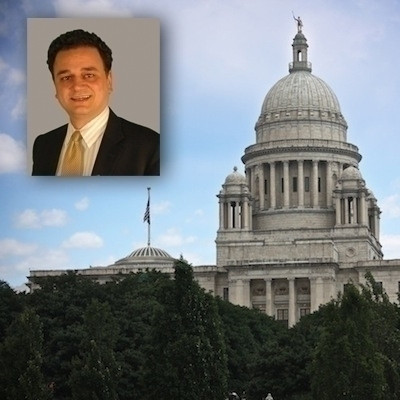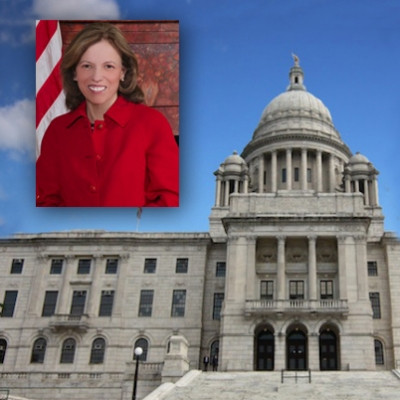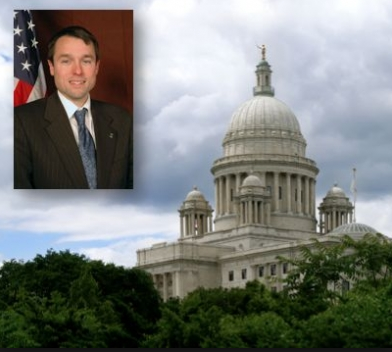Guest MINDSETTER™ Steve Durkee: Why Providence Needs Superman
Friday, March 07, 2014
No matter where you live in Rhode Island, you know the building well.
With its unique four-story lantern sitting at the top of its twenty-six stories, it is a stately, gracious example of an Art-Deco style skyscraper.
Built in 1928, the building was erected as a monument to the city and state’s economic might. As the tallest building in Rhode Island, and the most recognizable building in the region, the Industrial Trust Tower at 111 Westminster Street defines the Providence skyline and stands as a symbol to the city and state’s history.
GET THE LATEST BREAKING NEWS HERE -- SIGN UP FOR GOLOCAL FREE DAILY EBLASTOn these things, we can all agree. The question is, as the building sits vacant, where should we go from here?
Constructing the path for redevelopment
Cornish Associates was hired by the owner of 111 Westminster Street, High Rock Development, to help figure out the path forward with the redevelopment of this important and iconic building. We analyzed several different options, analyzing costs, benefits and impacts of each. Our study concluded that a mixed-use building, with a heavy emphasis on residential development is the most viable and most beneficial option.
The goal is to repurpose the 400,000 square foot building into 284 apartments of varying sizes and price points with 35,000 sf of office and retail space on the lower floors, with it’s stunning grand banking hall remaining publicly accessible. This important project requires political leadership and a commitment from the owner to save the building and ensure it contributes to our economy once again.
Supply and demand
Why rental apartments? Why not build office space? The answer is one of simple supply and demand and real life tax and real estate value consequences. Two separate economic impact studies both concluded the current office market in Providence is weak, with historically and consistently low absorption rates for office space. Restoring the building for office use would have a strong negative impact on surrounding office space in the city by flooding the supply and forcing rents down.
The apartment market in downtown Providence is very strong with current occupancy rates at approximately 97%. The redevelopment of 111 Westminster Street as largely residential units meets an immediate demand for housing downtown. Drawing from Cornish’s experience with nearly 200 apartments along Westminster Street, it is anticipated that these units will appeal to a diverse set of renters, from students to empty-nesters, young professionals and those moving into the downtown seeking a more urban lifestyle.
Public investments yield positive returns
For any significant historic building renovation in Rhode Island to be successful - there must be a public investment in the project. Why is this the case? The challenges of renovating historic structures are multiplied by their size coupled with current market conditions that won’t support the huge cost of renovations - making any return on private investment alone untenable. However, any public investment in the renovation of historic projects is truly an investment with a positive return.
Recent history indicates that for every dollar invested in redeveloping historic buildings through the State Historic Tax Credit program, over five dollars of economic activity is generated for the local and state economy. This was true for the Masonic Temple project, the Arcade and many other projects. And it is true for 111 Westminster and the newly proposed South Street Power Station project. No owner can renovate 111 Westminster without this public investment. Another point worth mentioning is that this is not a “bail-out”. The current owner, who has no debt on the property, has recognized the building is worth significantly less then when it was purchased and has acknowledged a loss of approximately $30 million dollars, 75% of the buildings value. This is a separate matter from the actual cost to redevelop the building where state and city investment is required.
Investments in the community
There’s a long history in Rhode Island of the state working with building owners, developers and institutions to save historic buildings that can become an important part of our economy. These projects are investments in the community, provide jobs, increase local values, enhance the state economy and instill pride in what is great about this Rhode Island. Recent examples include the Peerless Building, the Hotel Providence, The Foundry, the Mercantile Block developed by AS220 and the Providence G project.
A generation ago, Governor Bruce Sundlun along with other state and city leaders refused to allow the Shepard’s Building to be demolished understanding the negative impact it would have on Providence - the same goes for PPAC and before that the Biltmore. Today, the two transformative projects that demand the same foresight and leadership are the renovation of the former South Street Power Station into a shared nursing education center with Brown University, Rhode Island College and the University of Rhode Island as partners with the city and state. The other is 111 Westminster Street. When completed both of these projects will be catalytic and have a seismic impact on markets, on people, on the city landscape and urban possibilities. These projects are worthy of public investment.
Vacancy creates perception issue
The negative perception and impact of having the largest buildings in the capital city remain vacant will have a chilling effect on future development and long term planning in Providence.
Bringing strong leadership to bear to transform these buildings sends the positive message necessary to attract much needed investment from outside the state and sends a strong message that big things are possible here.
The type of public investment needed to move this project forward is not comparable to risky subsidies that failed, such as 38 Studios. This investment isn’t a gamble; it is a proven winner, as we’ve seen with the history of the State Historic Tax Credit Program. And, the state doesn’t make any investment until the project is 100% complete.
111 Westminster Street needs to be redeveloped and no developer can do it without state and municipal support. Like every significant building before it, a public/private partnership with the state and the city is required. Leaving it empty will have a negative impact on the economic development of Providence for years to come.
Steve joined Cornish Associates in 2010 as a Senior Associate and Director of Development to focus on the continuation of the revitalization of Downtown Providence. Prior to this he was the founder of Durkee Brown Architects where he was the managing partner for 16 years. Durkee is on a number of boards and committees including the RI Public Transit Authority and the Executive Committee of the Providence Foundation. He recently stepped down after 17 years, 11 as Chairman, of the Providence City Plan Commission
Related Slideshow: 7 Strategies for Rhode Island Economic Development in 2014
What will it take to move the Rhode Island economy forward in 2014? GoLocal talked with elected officials, candidates, and leaders for their economic development plans in the coming year.
Below are key elements of the economic priorities for Governor Lincoln Chafee, Speaker of the House Gordon Fox, Senate President M. Teresa Paiva-Weed, House Minority Leader Brian Newberry, gubernatorial hopefuls General Treasurer Gina Raimondo and Ken Block, and RI Center for Freedom and Prosperity's Mike Stenhouse.
Related Articles
- LISTEN: Superman Deal Similar to 38Studios?
- Russell Moore: Superman Is Not Curt Schilling
- Lisa Blais: No Public-Private Deals For Superman Building
- Superman Building Plans Heat Up: Who Are the Players?
- NEW: Block Says Superman Building Has All the Makings of 38 Studios
- The Scoop: Superman Building Spokesman Talking for Pell
- NEW: Superman Building Owner Seeking $70-$75M for Renovations
- The Superman Building: Downtown’s Ticking Time Bomb
- PODCAST: Providence Superman Building
- Waiting for Superman - The Rhode Island Premiere
- Donna Perry: Superman Building Tax Credit Not So Super
- PODCAST: Will Superman Building Proposal Stand Chance for Success?
- Will New Superman Building Proposal Stand Chance for Success?
- John Hazen White’s Lookout: Superman Lights Will Shine Again
- Providence “Superman Building” Closes—GOP as New Superman
- LISTEN: Superman Building Players + Who’s Hot and Who’s Not
- Rep O’Neill Criticizes Fox & Superman Plan - Similar to 38 Studios



















